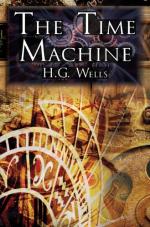|
This section contains 2,378 words (approx. 8 pages at 300 words per page) |

|
SOURCE: Eisenstein, Alex. “The Time Machine and the End of Man.” Science Fiction Studies 3, no. 2 (July 1976): 161-65.
In the following essay, Eisenstein investigates the cycle of evolution as illustrated in The Time Machine.
As many critics have observed, H. G. Wells was preoccupied very early with speculations on evolution, in particular the evolution of Man and the prospects of intelligent life, whatever its origins. The Time Machine (1895), The War of the Worlds (1898), and The First Men in the Moon (1901) are the best known examples of his interest in such matters, but certain of his shorter works also reflect this concern. Frequently, Wells would recapitulate and refine his major ideas, mining old essays for new story material or refashioning the elements of one tale in the context of another; various scholars have explored the interpenetration of these works in some detail.
In “The Man of the Year Million” (essay...
|
This section contains 2,378 words (approx. 8 pages at 300 words per page) |

|


